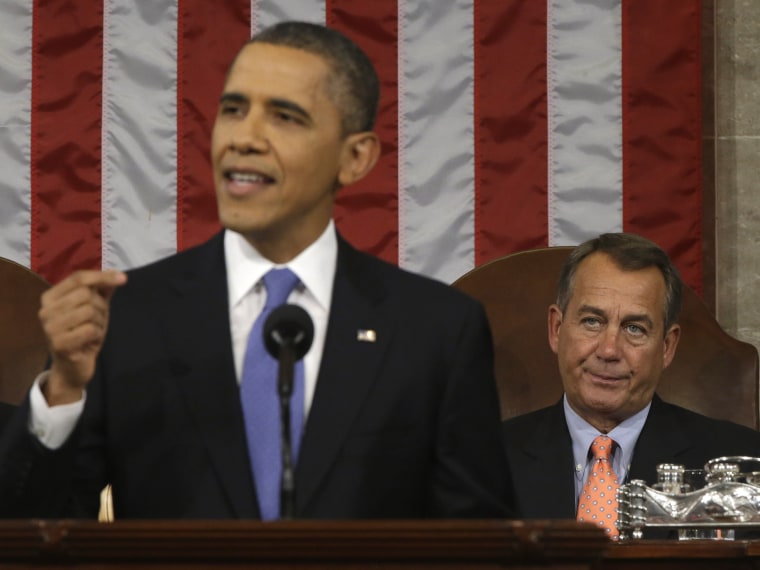Let me finish tonight with the long game on President Obama's stepped-up use of his executive power.
We talked about it earlier: right now, in this moment, the politics of this are really good for the president. He's well into his second term, his approval rating has fallen, and Republicans have made it abundantly clear that anything with his fingerprints on it just isn't going to get through Congress. Remember the fever that Obama said would be broken if he got re-elected in 2012? Well, it's just as strong as ever--maybe stronger.
Faced with this reality, Obama had two choices: he could sit there and take it--bemoaning all the obstruction and knee-jerk opposition but throwing up his hands and saying, 'What can I do?'--or he could fight back.
And I think we know which options he's going with.
Republicans say no to a higher minimum wage, so Obama orders all federal contractors to pay their workers more.
Republicans say no to passing legislation to cut carbon emissions and fight climate change, so Obama orders the EPA to set new rules to reduce emissions from coal plants.
Republicans won't touch anything having to do with gay rights, so Obama orders that same-sex couples be made eligible for family and medical leave too.
And now, this week, Republicans officially say no to comprehensive immigration reform--and Obama says: fine, if you won't do anything, I'll use my executive power to do it on my own.
Republicans are howling in protest and they're also getting ready to sue the president for his use of executive power. But this is a battle the White House is thrilled to have. I think of the old line from David McCullough about Harry Truman, who ran against a do-nothing Republican Congress in 1948 and won a race no one thought he'd win: "There was something in the American character," McCullough wrote, "that responded to a fighter."
And I think that something is still there in the American character. We'd rather watch our president step into the ring and fight for what he believes than stand on the sidelines and say, "Nah, there's no point." So this fight over executive power, this willingness by the president to test the limits of what he's allowed to do on his own without Congress...it's good politics.
But I do think we need to take a step back and think about this too. John Boehner and Republicans have their own cynical reasons for suing Obama, but it may be good for the system if they do because we've entered a scary new era in our political history--an era where the two parties are increasingly becoming distinct and isolated tribes with deep cultural, geographic, and ideological divisions separating them.
"We've arrived at a moment I don't think our Founders anticipated: a moment when the brilliant system they devised is threatened by political tribalism."'
For our system to work, there has to be at least some cooperation between the branches of government. But since Republicans gained control of the House in 2010, there's been none. We've nearly defaulted on our debt twice, we've had a shutdown, we've had a massive backlog of nominees for key agencies and the federal courts. You may not like that Republicans have said no to just about everything Obama has asked for, that on most issues they'd rather do nothing than meet him halfway, but they run the House--the people's House--and the way our system is set up, they can make that choice if they want to. The onus is supposed to be on us, as voters, to throw them out if we don't like that choice.
But maybe that's the real issue here. We've arrived at a moment I don't think our Founders anticipated: a moment when the brilliant system they devised is threatened by political tribalism. What power does a president, whether it's Obama now or someday a Republican president fighting a Democratic Congress, really have to go around a Congress that says no to everything he wants?
It's probably about time we got that question answered.
